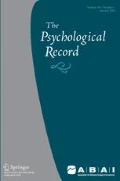References
Birch, H. G. (1945). The relation of prior experience to insightful problem solving. Journal of Comparative Psychology, 38, 367–383.
Blough, D. S. (1957). Spectral sensitivity in the pigeon. Journal of the Optical Society of America, 47, 827–833.
Blumberg, M. S., & Wasserman, E. A. (1995). Animal mind and the argument from design. American Psychologist, 50(3), 133–144.
Boakes, R. (1984). From Darwin to behaviorism: Psychology and the minds of animals. New York, NY: Cambridge University Press.
Brosnan, S. F., & de Waal, F. B. M. (2003). Monkeys reject unequal pay. Nature, 425, 297–299.
Brosnan, S. F., & de Waal, F. B. M. (2014). The evolution of responses to (un)fairness. Science, 346(6207), 1–7.
Candland, D. K. (1993). Feral children and clever animals: Reflections on human nature. New York, NY: Oxford University Press.
Carpenter, S. (2012, September 6). Harvard psychology researcher committed fraud, U.S. investigation concludes. Science, Retrieved from: http://www.sciencemag.org/news/2012/09/harvard-psychology-researcher-committed-fraud-us-investigation-concludes
Chomsky, N. (1959). Review of Skinner’s Verbal Behavior. Language, 35, 26–58.
de Waal, F. B. M. (2016). Are we smart enough to know how smart animals are? New York, NY: Norton.
Epstein, R. (1987). The spontaneous interconnection of four repertoires of behavior in a pigeon. Journal of Comparative Psychology, 101, 197–201.
Feynman, R. (1974, June). Cargo cult science. Engineering & Science, 10–13.
Köhler, W. (1925). The mentality of apes. London, UK: Routledge & Kegan Paul.
Lattal, K. A., St. Peter Pipkin, C., & Escobar, R. (2013). Operant extinction: Elimination and generation of behavior. In G. J. Madden (Ed.), APA handbook of behavior analysis, Vol. 2: Translating principles into practice (pp. 77–107). Washington, DC: American Psychological Association.
Moore, B. R., & Stuttard, S. (1979). Dr. Guthrie and Felis domesticus or: Tripping over the cat. Science, 205, 1031–1033.
Morgan, C. L. (1894). An introduction to comparative psychology. London, UK: Scott.
Morgan, C. L. (1903). An introduction to comparative psychology (2 nd ed., rev.). London, UK: Scott.
Pear, J. (2004). The science of learning. New York, NY: Routledge.
Pfungst, O. (1911). Clever Hans (the horse of Mr. von Osten): A contribution to experimental animal and human psychology. New York, NY: Henry Holt.
Poling, A., Nickel, M., & Alling, K. (1990). Free birds aren’t fat. Weight gain in captured wild pigeons maintained under laboratory conditions. Journal of the Experimental Analysis of Behavior, 53(3), 423–424.
Romanes, G. (1886). Animal intelligence. New York, NY: Appleton (Original work published 1882).
Sagan, C. (1987). The burden of skepticism. Skeptical Inquirer, 12(1), 46.
Seligman, M. E. P., Railton, P., Baumeister, R. G., & Sripada, C. (2013). Navigating into the future or driven by the past. Perspectives on Psychological Science, 8, 119–141.
Skinner, B. F. (1938). The behavior of organisms. New York, NY: Appleton-Century-Crofts.
Skinner, B. F. (1956). A case history in the scientific method. American Psychologist, 11, 221–233.
Skinner, B. F. (1969). Contingencies of reinforcement: A theoretical analysis. New York, NY: Appleton-Century-Crofts.
Skinner, B. F. (1974). About behaviorism. New York, NY: Knopf.
Thompson, R. K. R., & Contie, C. L. (1994). Further reflections on mirror usage by pigeons: Lessons from Winnie-the-Pooh and Pinocchio too. In S. T. Parker, R. W. Mitchell, & M. L. Boccia (Eds.), Self-awareness in animals and humans (pp. 392–409). Cambridge, UK: Cambridge University Press.
Thorndike, E. L. (1898). Animal intelligence: An experimental study of the associative processes in animals. Psychological Monographs: General & Applied, 2(4), i–109.
Timberlake, W. (1997). An animal-centered, causal-systems approach to the understanding and control of behavior. Applied Animal Behavior Science, 53, 107–129.
Tinklepaugh, O. L. (1928). An experimental study of representative factors in monkeys. Journal of Comparative Psychology, 8, 197–236.
Todd, J. T., & Morris, E. K. (1992). Case histories in the great power of steady misrepresentation. American Psychologist, 47(11), 1441–1453.
Uchino, E., & Watanabe, S. (2014). Self-recognition in pigeons revisited. Journal of the Experimental Analysis of Behavior, 102, 327–334.
Vaughn, L. (2008). The power of critical thinking (second ed.). New York: Oxford University Press.
Washburn, M. F. (1908). The animal mind. New York, NY: Macmillan.
Wynne, C. D. L. (2004). The perils of anthropomorphism. Nature, 428, 606.
Acknowledgments
The author gratefully acknowledges the helpful comments of Stephanie da Silva on an earlier version of this article as well as the comments from the anonymous reviewers.
Author information
Authors and Affiliations
Corresponding author
Ethics declarations
Conflict of Interest
The sole author declares that he/she has no conflict of interest.
Human and Animal Rights and Informed Consent
This article does not contain any studies with human participants or animals performed by any of the authors.
No animals were involved in the preparation of this manuscript.
No human participants were involved in the preparation of this manuscript.
Rights and permissions
About this article
Cite this article
Phelps, B.J. And We Are the Easiest to Fool: A Review of Franz de Waal’s Are We Smart Enough to Know How Smart Animals Are?. Psychol Rec 68, 561–566 (2018). https://doi.org/10.1007/s40732-018-0301-4
Published:
Issue Date:
DOI: https://doi.org/10.1007/s40732-018-0301-4

